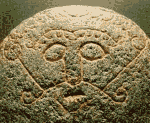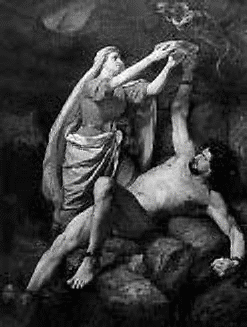Why Loki?
Written by Lokadottir, © 2001.
in ioci terribiles veritas
"Loki... is the creature who transgresses all boundaries; even more significant, Loki represents the boundary itself... Loki may most properly be seen as representative of more than either the boundary or the boundary crosser; in the character and role of Loki, the boundary, difference itself, has collapsed. But to say that it 'has collapsed' implies its prior existence, and this does not adequately describe Loki. In Loki that opposition has never been created; what is elsewhere two is one in Loki." -- Karen Swenson

| One comment I've heard repeatedly is that since we have no historical record for followers of Loki, it isn't proper that he should be getting so much attention in the present day. Times change, Gods change - why not honour Loki? In the past, there were definitely shifts in emphasis from Tiwaz to Odin, and later to Thor. When life changes so quickly it ill behooves us to let our attention falter for a moment, lest we be left behind, could it not even be said (with only a little partisanship) that we are living in a Lokean age? | 
|
It isn't logically possible to prove a negative: just because there is no evidence for followers of Loki in times past, neither is there irrefutable proof that they did not exist at all. One can conjure whatever images or excuses one likes, proto-Lokeans striking off on their own individualistic path, or clustered in small groups round a common fire, wondering if anyone would realise what they were doing... I can't say it ever happened - in all honesty, I seriously doubt it - but no one can say with complete and unshakable certainty that it never happened, either.
The things most people seem to recall about Loki are: his responsibility for the death of Baldr (according to Snorri and later scholars who took his word for it), and that he opposes the Gods at Ragnarok. I never claimed he was perfect, did I? I'm inclined to believe he would actually be insulted by such a scurrilous imputation as perfection, and perfection's related implication as something which has no need of alteration. The only real certainty is change, a province over which his influence holds considerable sway. One thing I think people don't remember often enough is that certain things must be done so that others can come to pass. Whatever else you may say about Loki, above all, he is necessary. It's often a lousy, thankless job he carries off with such elan.

|
We lose a lot of the flavour and richness of the Norse tales if we look at them simplistically as parables of good versus evil, which is the legacy of living in a society with a Judeo-Islamo-Christian frame of reference. Odin could be considered both cruel and capricious, but I haven't seen that costs him much popularity. Perhaps it's because his less savoury characteristics are easier to ignore or explain away? Or perhaps he just has better public relations. |
Odin's anomalous character in his roles as a god of wisdom and a god of war are more readily subject to analysis, for in these he merely represents both sides of a single coin. The price of wisdom is often sorrow and disillusionment in equal measure to that which is gained; warfare always implies the ignominity of defeat at the same moment if promises glorious victory. Loki, on the other hand, is the coin which is flipped and lands on its edge.
If you stop to think on it, for all the times Loki was prevailed upon to get the Gods out of a particularly sticky situation, can you name one single instance when someone did something for him? (Merely deciding not to kill him does not count.) Even when it's perfectly evident from the outset that Loki is the author of their troubles, he's still the one they depend upon to set matters to rights. One might consider this a cautionary tale about the nature of altruism and enlightened self-interest: do what you will for some people and they'll more likely resent you than be grateful for being beholden to you.

|
The unintended consequences
of Loki's actions are often more meaningful and far-reaching than the event
which set them into motion. Cutting off Sif's hair might have been one of
his more juvenile efforts on the face of it, but making amends for this little
prank resulted in the making of the Treasures of the Gods: Gungnir, Odin's
spear, Mjollnir, Thor's hammer, and the rest.
Of course, I always did wonder whether Mjollnir's short handle didn't have some sort of a metaphorical context, especially considering its use in the Lay of Thrymm to hallow the bride in an almost painfully obvious use of fertility/phallic symbolism. I have been counseled that it is not the size of its handle, but what Thor did with the hammer which counts. But perhaps one might view Thor's aggression is just a teeny bit of overcompensation? |
Loki offers his head in his wager with the dwarves Brock and Eitri when they contrive to make treasures equal to those made by the sons of Ivaldi at Loki's behest. But he denies it to them after they have won the bet by pointing out that they might not have any part of his neck. In what will become one of the repeating themes of Loki's appearances in the myth cycle, his lips are sewn shut by Brokk in a vindictive gesture, which has the effect of temporarily "binding" the flow of his guileful words.
Loki has no need of hammer nor spear nor any other tool while he has the more powerful, yet more ephemeral, gift of speech. When he occasionally has need of something more tangible, as he does when he borrows the feather-cloaks of Freyja and Frigg, he needs nothing more than persuasion to acquire them. Words, like Loki himself, can be wonderful allies or fearsome enemies, depending on the circumstances.
Internal consistency within the myths is not necessarily evident, or even necessarily a good thing. One does have to wonder how Loki found himself in a position to lop Sif's hair off in the first place. Here, Lokasenna provides us with a perfectly reasonable explanation: he was already in Sif's bed when he did it. And in the Lay of Harbarth, does not the ferryman (none other than Odin, of course, who ought to be in a position to know) tell Thor that "With Sif someone sleeps in her bower"?
Adding gratuitous insult
to the injury already done to her marriage vows seems perfectly in keeping
with Loki's character. The injury could not have been too great, however,
since we still see Thor and Loki wandering around together after this. Either
that, or Thor was just a bit too thick to figure it out. Since Thor isn't
exactly known as a model of intellectual acumen, I'd tend to lean towards
the latter explanation.
| Conversely, one
has to wonder how Sigyn viewed Loki as a husband, since she remains steadfastly
by him until Ragnarok, keeping him from as much harm as she is able. If he'd
been truly awful to her, Sigyn could have just told him to sod off and gone
on her way. Njord and Skadi parted for far more trivial reasons without apparent
censure.
For all his flaws, Loki inspires a degree of loyalty not only in Sigyn, but in Odin as well. Even though he has already played a part in Baldr's sojourn in Hel, his oath of blood-brotherhood with the All-father secures him a place at Aegir's feast, above the objections of the other Gods and Goddesses. |

|
Loki is quite probably the most dynamic figure in Norse mythology - one of the few dynamic characters, along with Odin. Most of the other Gods and Goddesses are relatively static: they do not change over time, nor do they alter according to their experiences. They are - not to put too fine a point on it - more or less eternal, which is one reason the shattering of this assumption with the death of Baldr is such a traumatic event.
Freyja remains essentially a perpetual daughter of joy, while Thor seems content with his role as plodding giant smasher. When they acquire things, as Freyja did Brisingamen, or Thor Mjollnir, these are merely emblematic of the basic nature they already express rather than being transformative events. This is also one of the implicit underpinning of the marriage between Njord and Skadi, for neither is willing or able to transform their nature in order to be able to accommodate the other. Rather than being inexplicable (as some would have it), the blood-brotherhood of Loki and Odin seems both fitting and entirely natural in light of their mutual mutability.
I do wonder sometimes, though, if some of Loki's actions couldn't have been spurred by a gradual disillusionment with the other inhabitants of Asgard. Here he was, the son of two giants who were apparently so unremarkable that all we have left are their names, risen to become blood-brother of the most powerful of all the Aesir. He was "a member of the club," but as time went on, perhaps he began to question whether it was a club worth joining?
The Aesir and Jotnar might have different goals in mind, but they often seem to employ the same means and methods to arrive at them. Quite often, those means or methods were Loki himself. With Lokasenna in mind, I can't help but think that there is nothing so cutting as the cynicism of a frustrated idealist unleashed in full ferment. I can't begin to speculate what he expected or wanted from his bond with Odin; I can't help but believe that he didn't get it.
